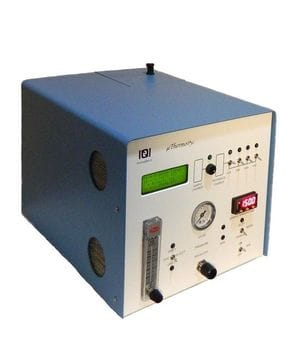NEW ANALYTICAL CAPABILITIES
|
Product Overview
The µThermoPyc™ is a unique, R&D oriented volumetric analyzer with versatile software design for automated runs using a PC. In its basic implementation it allows true volume measurements of small sample sizes in the temperature range 0 - 150 C. In addition to typical true density determination at user-defined various temperatures, continuous temperature scans allows study of sample behavior within a selected range of temperatures. Considering the small size of reference chamber (about 1 cc), small dead volume of the sample chamber (about 0.5cc), 24 bits resolution of data acquisition system, high accuracy in volume measurements and high sensitivity of pressure changes during temperature scans is achieved. Complex experiments can be carried out using unique approach to software design: the user composes the sequence of activities from the predefined functions (macros). Once the experiment course is defined, the template can be saved and reused later. Provisions were made to enhance the design with additional capabilities and/or interface with other analytical instruments, like GC/MS for evolved gas analysis, purge and trap devices, borescopes for visual observations, etc. Applications:
Optional:
Accessories (all included):
|
Technical Notes
|
Gas (helium) pycnometers are popular instruments for true volume (density) determination.
New designs and additional capabilities of the pycnometers from InstruQuest Inc. provide R&D scientists with versatile and inexpensive tools for material characterization. Although the gas expansion principle based on the ideal gas law is simple, the more detailed and technological description is not easily available. The presented below technical notes are intended for the educational and informational purposes in understanding and using these instruments. |
To inquire about our products, please contact us at: [email protected]
